
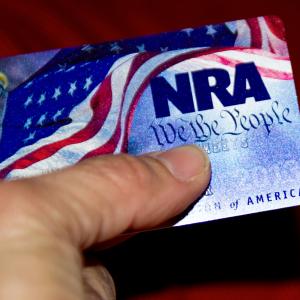
A membership card for the National Rifle Association. KAREN BLEIER/AFP/Getty Images
Tuesday was the 84th birthday of Rev. Dr. Martin Luther King, Jr. I don’t know about you, but I miss his words, so I offer a few. King said “people often hate each other because they fear each other, they fear each other because they don’t know each other, they don’t know each other because they cannot communicate, they cannot communicate because they are separated.” I would add to his words: ‘and in that separation they seek guns.’ As an evangelical Christian, I’m going to make this theological.
Wayne LaPierre, executive vice president of the National Rifle Association, said this as his response to the massacre of children at Sandy Hook elementary in Newtown, Conn.: “the only thing that stops a bad guy with a gun is a good guy with a gun.”
That statement is at the heart of the problem of gun violence in America today — not just because it is factually flawed, which of course it is, but also because it is morally mistaken, theologically dangerous, and religiously repugnant.
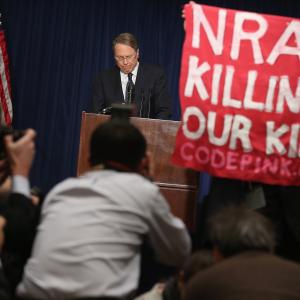
A demonstrator from CodePink holds up a banner as the NRA's Wayne LaPierre delivers remarks. Chip Somodevilla/Getty Images
What does the birth of the baby Jesus 2,000 years ago have to offer the violent, troubled world we live in? Or what would Jesus say to the NRA?
I want to suggest — a lot. A whole lot.
Jesus entered the world from a posture of absolute vulnerability — as an unarmed, innocent child during a time of tremendous violence. The Bible speaks of a terrible massacre as Jesus was born, an unspeakable act of violence as King Herod slaughters children throughout the land hoping to kill Jesus (which the church remembers annually as the massacre of the Holy Innocents).
Perhaps the original Christmas was marked more with agony and grief like that in Connecticut than with the glitz and glamour of the shopping malls and Christmas parades. For just as Mary and Joseph celebrated their newborn baby, there were plenty of other moms and dads in utter agony because their kids had just been killed.
From his birth in the manger as a homeless refugee until his brutal execution on the Roman cross, Jesus was very familiar with violence. Emmanuel means “God with us.” Jesus’s coming to earth is all about a God who leaves the comfort of heaven to join the suffering on earth. The fact that Christians throughout the world regularly identify with a victim of violence — and a nonviolent, grace-filled, forgiving victim — is perhaps one of the most fundamentally life-altering and world-changing assumptions of the Christian faith. Or it should be.
So what does that have to do with the NRA? Underneath the rhetoric of the gun-control debate this Christmas is a nagging question: are more guns the solution to our gun problem?

Newtown prayer vigil in April. Photo by Brandon Hook / Sojourners
The reality is bleak: 33 Americans are killed and 260 wounded from gun violence daily. Yesterday, as the culmination of its No More Names bus tour, which reached 25 states in 100 days, Mayors Against Illegal Guns rallied at the Capitol to urge Congress to pass a bill enforcing mandatory background checks for potential gun owners.
Spearheaded in 2006 by Boston Mayor Thomas Menino and New York Mayor Michael Bloomberg, MAIG began with 15 mayors, and has since grown to more than 1,000. The group’s goal is to make American communities safer by reducing the number of illegally obtained guns and by holding dealers accountable for potential gun-purchasers.
At the Hill gathering, representatives from myriad groups came together to advocate for stricter background checks and to push Congress out of their inaction. Tuesday, the Senate postponed a hearing on the legality of “Stand Your Ground” laws — on the heels of Monday’s Navy Yard gun violence.
Congressional representatives, mayors, police officers, military veterans, NRA members, women’s organizations, advocacy groups such as Mothers Demanding Action, faith community leaders (rabbis, priests, and pastors), university groups, children, gun violence survivors, and family members of those who have lost someone to gun violence were all in attendance at the No More Names rally. A broad coalition: racially, socioeconomically, and generationally diverse, as indiscriminant as the bullets that affect us all.
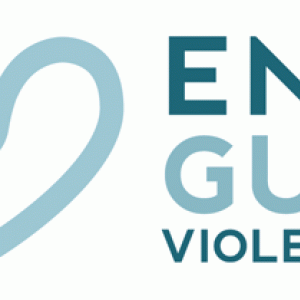
Graphic from "Sorrow, Anger, ACTION! - A Gathering of Voices Against Gun Violence", via Moms Rising.
In the fourth chapter of Genesis, after the proverbial “fall” of humanity, two brothers stand in a field. Cain is a farmer — Abel, a herdsman. Both bring offerings from their labor to God, but Abel brings his first fruits, so God looks on Abel’s offering with delight. In a jealous rage Cain rises up against Abel and kills him. This is the first recorded murder in the Bible.
I will never forget walking onto the National Mall early on the morning of April 11, 2013. As I approached a mass of people and television cameras between the Washington Monument and the Capitol Building I was overcome by the sight of more than 3,300 crosses and other religious symbols rising from the heart of our capital city. They represented the graves of all the people who have died by gunfire since the December 14, 2012 shooting massacre at Newtown, Conn. It was profound. It was overwhelming.
Mayors Against Illegal Guns is buidling grassroots organizations across the country. After setbacks in Congress, the coalition is shifting its focus to local politicians and state legislatures. The coalition faces an uphill battle in many states against well-organized networks of gun enthusiasts, but New York City Mayor Michael Bloomberg has vowed to continue the fight. The New York Times reports:
“We don’t give up,” said John Feinblatt, who oversees Mayors Against Illegal Guns and serves as Mr. Bloomberg’s chief policy adviser. “We’re here for the long haul.”
Read more here.
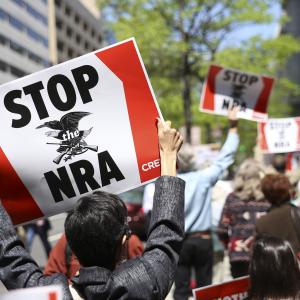
A woman protests the NRA's influence in Washington, DC on April 25. Photo by Brandon Hook / Sojourners
Before last week’s Senate vote, we learned that 90% of Americans supported universal background checks as a way to reduce gun violence.
The Senate’s vote against background checks shows that public opinion is not the driving — or defining — force behind America’s gun culture. In fact, to find that force, you don’t have to look any farther than money.

Sojourners' bumper sticker
When the really hard stuff happens, when we witness the true face of evil, Americans have a predictable habit. Even as cameras feed the latest bubble-shattering violence into our family rooms, we start looking for someone or something — anything — other than the actual perpetrators to stone. We panic for a scapegoat.
We hunt tirelessly for the person (a parent, an educator, a cop) who didn't catch the warning signs, who failed to read a memo — anyone on whose shoulders we can cast our collective fear — then rush as many measures into place as possible, no matter the cost in treasure or freedoms, to regain an illusion of safety and impenetrability.
One iteration of that really hard stuff happened at Sandy Hook. The backstory is eerily familiar. A young man, left to stew in our culture's juices, fleshes out the nightmare in his broken soul, and deals out tragedy in living color as if the holy innocents of Newtown were mere pixels on a screen, points in a twisted "shooter." Now, just four months later, it's a swept-away moment of terror and sadness that everyone just wants to forget because it's unthinkable to think on it any longer.
Virginia Tech, Aurora, and Newtown each stopped the nation in its tracks but we eventually moved on, and before anyone might guess, well over 3,000 more have died by gun violence in America since December.
Rev. Sam Sailor of of Hartford, Conn., speaks at the vigil on April 11. Photo by Brandon Hook / Sojourners
Guns are dangerous idols. While mass shootings are happening at an alarming rate and an epidemic of gun violence plagues our nation’s cities, our society’s fanatical devotion to weapons prevents us from enacting solutions to curb the violence. The cost of worshipping these false idols continues to rise, as firearms kill more than 80 people a day.
Since the Dec. 14 shooting in Newton, Conn., nearly 3,500 people have died because of a gun. Some of them were suicides. Some were gang-related gun deaths. Many use these facts to insinuate that the deaths somehow aren't equally tragic. But as Christians we know that all of them were children of God created in the Divine image.
While the idolatry rages on, prophets are beginning to speak out.
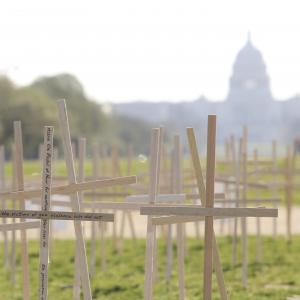
3,300 crosses & religious symbols staked on the National Mall. Photo by Brandon Hook / Sojourners
Last week, the Senate began a floor debate on gun control that brought to mind an earlier “floor debate” several months ago in Chaska, Minn.
Ever since our Community Dialogue on “Gun Violence in America,” I’ve searched for answers to what happened.
A crowd of 138 people came out on a Tuesday night to chime in following the tragedy at Sandy Hook in Newtown, Conn.
As the night wore on, it became clear that there would be no real dialogue, no moderated discussion. No give-and-take. A series of monologues, without interruption and with a time limit, was the best we could expect.
Fear, anger, hostility, and suspicion were in the room. The room was hot.
The months following have been a personal search for understanding of what happened that night, and how we in America move forward together on such a divisive issue.
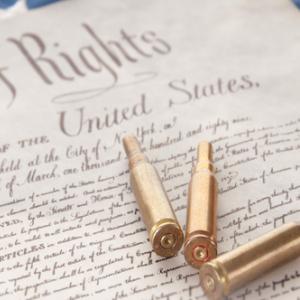
Bill of Rights, Cheryl Casey/ Shutterstock.com
Meaning happens when the purposes of the writer come together with what the reader thinks is important. Since all aspects of any one thing cannot be perceived all at once, we focus our attention on this or that aspect of a thing depending upon what we want to achieve. This is why we can read a particular text many times and find new insights each time. This is also why we cannot agree on what the Second Amendment of the U.S. Constitution means.
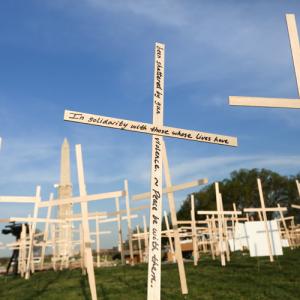
Crosses & religious symbols on National Mall represent 3,300+ gun deaths since Newtown. Heather Wilson / PICO National Network
Today, on the National Mall, I stood with fellow faith leaders, including clergy from Newtown, to remember lives lost at Sandy Hook elementary school and the 3,364 gun deaths that have happened since.
We stood in front of a field of crosses, Stars of David, and other grave markers, and it broke my heart to think that each one stood for a life ended too soon. It doesn’t have to be this way. Commonsense steps to reduce gun violence are within our reach. Just today the Senate voted to begin the debate. But there is much work to do. Lawmakers need to hear from you.
This is one of the clearest examples of a stark democratic choice: the old politics of guns or the morality of the common good. The clergy are here today for the common good.
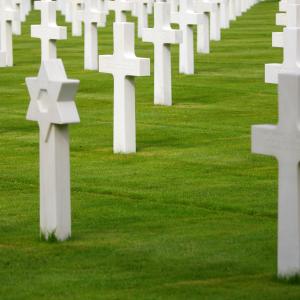
Interfaith grave markers, cofkocof, Shutterstock.com
For many pastors of urban congregations, “stepping up” to end gun violence stems from a very personal place — as they have been forced to bury their own neighbors and church members. According to Samuel Rodriguez, gun violence – especially in urban areas – deeply affects interfaith leaders there, who are declaring violence-free zones and taking action.
Faith-based leaders in Philadelphia and Chicago have rallied to fight gun violence. Heeding God’s Call, based in Philadelphia, holds prayer vigils at the locations of gun homicides as well as organizes gun-store campaigns that ask gun store owners to sign a code of conduct.
In Chicago, All Saints Episcopal Church organized CROSSwalk, a walk through downtown Chicago, which drew a few thousand people the past two years. Violence on Chicago streets has killed more than 800 young people in the last six years.
Nuenke addressed breaking the chain of violence and pain that we see in every community. He quoted 2 Corinthians 1:3-4 and Isaiah 61 as examples of God’s compassion and its life-changing, healing power.
“What would happen if the body of Christ more fully was involved in living out Christ’s compassion in a broken world?” Nuenke asked. “Sometimes people who are hurt or experience violence end up hurting other people. The care and compassion they might receive from the Lord Jesus will impact them more in 20-30 years than anything else.”
Driven by our moral call to protect each member of our society, people of faith have been outspoken about the need to craft meaningful legislation to reduce gun violence. This week, Mayors Against Illegal Guns released an ad featuring a diverse group of religious leaders, including Sojourners CEO and President Jim Wallis, leaders to demand that Congress make common-sense reforms to our nation’s legislation that is failing to keep us safe.
The faith community continues to speak loudly and clearly about the moral urgency to address this issue. The only question is whether Congress will listen and finally address the epidemic of violence that plagues our nation.
As a mom of two small children – one who is the same age as children killed in Newton – I cannot imagine how hard it must have been for this dad to speak about his loss at the Senate Judiciary Committee recently about a proposed assault weapons ban. Thank you for your courage.
Now it's time to ask Congress to show some courage and enact sensible measures to prevent gun violence. Too many parents have already lost their children.
Visit NBCNews.com for breaking news, world news, and news about the economy

Chicago skyline, nialat / Shutterstock.com
My city of Chicago, known as the City with Big Shoulders, is now on its knees. But it’s not prostrate in some humble submission to God. No. Instead Chicago is weeping from the emotional exhaustion of having to bury too many youth who have been murdered.
Last year Chicago recorded 2,400 shootings and more than 505 murders, of which more than 108 were teenagers of color from seven violent communities. Already 2013, with less than two months into its birth, has seen 49 murders. Those of us on the ground seeking to bring change to this pandemic of violence know that if the Chicago cold winters are this violent, then the hot summers will not cool off. On top of the hard and constant news about those who are killing and being killed, Chicago Police stats show that only 34 percent of the murders get solved within one year. If the detectives have two years on a case, then the rate barely reaches 50 percent. The national average of murders solved is 64 percent. New York’s rate is only 60 percent. In Chicago, though, one has a 50-50 chance of getting away with a murder.
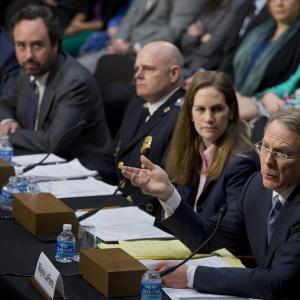
NRA's Wayne LaPierre testifies at a Senate hearing on gun violence. Tom Williams/CQ Roll Call
In the 1980s television show, “Fantasy Island,” the island watchman heralded the arrival of individuals attempting to escape their reality with a call of “the plane … the plane … the plane!”
In the weeks since the Sandy Hook tragedy, I’ve spent much of my time in Washington, D.C., preaching about our moral mandate to reduce gun violence, especially in our urban neighborhoods. However, in my time in the capital, I have come to feel as though there are many arriving in Washington on the proverbial plane, escaping the realities of their hometowns, for the Fantasy Island in the beltway.
In the Book of Proverbs, we read, “Buy the truth — don't sell it for love or money; buy wisdom, buy education, buy insight (Proverbs 23:23, The Message).”
Sadly in Washington, truth seems to be for sale; wisdom seems to be radically individualized; education seems to be mocked; and insight seems to be unable to breach the partisan walls in our nation’s capital.

Gun shot in window, Iurii Konoval / Shutterstock.com
Death doesn’t make sense — especially when it interrupts the life of one so young. Richard Twiss was only 58 years old.
It makes me think: Richard was one life, cut short by a heart attack. What about all the images of God erased from our lives and families every year through gun violence in the U.S.? What about their families and pastors and youth groups who held vigils in waiting rooms across the country? What about the estimated 1,793 gun deaths since the Newtown massacre? How valuable are their lives?
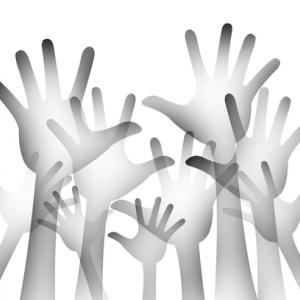
DeiMosz / Shutterstock.com
Edmund Burke once said, "all that is necessary for the triumph of evil is that good men do nothing." So what is at the heart of the endless stream of violence in our country — is it guns or is it something a lot harder to eradicate — passivity?
The overwhelming response would likely be "it's the guns, stupid." But in this fight, the individual with the loaded AK-47 rifle may be only slightly less dangerous than the passive citizen, the average person who may think "something should be done about guns,” but fails to stand up and make their voice heard.

Gun image, val lawless / Shutterstock.com
A well-known restorative justice film, "A Justice That Heals" recounts the role of faith and the church in caring for the families of both a murderer and his victim. The film climaxes in the mother’s act of forgiveness and counsel to the young man who killed her son. The power of that image of repentance, reconciliation, and restoration almost obscures another dimension of the grieving family's response to the death of their son. The victim's father resigns his job and becomes the director of an advocacy group for gun control.
The late Carl Dudley demonstrated in his research on mobilizing congregations that communities of faith rally to advocacy only after they have generated sufficient energy about and engagement with those affected by the policy. Congregations care about people not policy, stories over statistics, and narratives before numbers. Even the civil rights movement found its genesis in the story of Rosa Parks, and others like her, rather than in the "ethics" of segregation and discrimination. So, like the family in "A Justice That Heals," our work to mobilize around gun control requires creating a climate where people's experience with those who are victimized by bad policy.
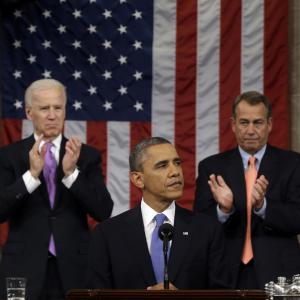
U.S. President Barack Obama at the State of the Union Address on Feb. 12. Charles Dharapak-Pool/Getty Images
There is a tradition in the black church named “call and response.” It’s simply the experience of the preacher “calling” and the congregation “responding.” I’ve always loved it. When you’re preaching in a black church, and the congregants begin to actively and vocally respond, your sermon can actually get better, stronger, deeper, and more powerful than it might have been if everyone just sat there. Sermons get interactive. Congregations can be inspired by the preacher — and the other way around. Ideas grow, get taken further, and even develop during and after the sermon. And it can make things change.
After his first year in office, I sent a letter to President Barack Obama humbly suggesting he needed “the political equivalent of the black church’s call and response.” Just talking to and in Washington was never going to get important things done. Washington just sits there and mostly makes sure that things don’t change — and that the special interests that buy, shape, and control this city usually have their way. (That private letter to the president will be published for the first time in my new book about the common good coming out in April.)
I recalled something Obama said right after the 2008 election — that he would need “the wind of a movement at my back” to get anything really important done. He would have to go over the heads of Washington, to speak directly to the people that had elected him and also those who didn’t. He would have to have public debates about the common good and not just debate in Washington.
I saw him do that in this week’s State of the Union speech.
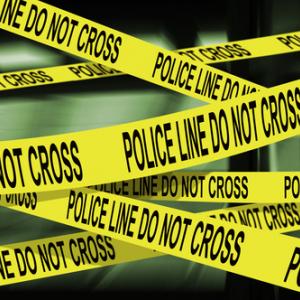
Police crime scene tape, Luis Louro /Shutterstock.com
What do we do? How do we stop this?
“Motorists and walkers scattered in terror Monday night as a gunman fired two bursts of bullets at passing vehicles near an Oakdale grocery store, killing a 10-year-old boy and wounding two other people. Click HERE for the Star-Tribune story.
We can‘t stop it. America is an arsenal with an open door. And any attempt to close the door is “unconstitutional.” Liberty, one of three basic rights outlined by The Declaration of Independence, is killing the other two. “Liberty” trumps not only “the pursuit of happiness” but “life” itself.
“At least two vehicles struck by bullets sped into the parking lot of the nearby Rainbow Foods at 7053 10th St. N. seeking help.”
Responsible gun owners did not do this. An irresponsible gun owner did this. But it would have made not one ounce of difference if the passersby had been armed. They were sitting ducks, like the ducks in a carnival booth. There is no protection against irresponsible use of a firearm.
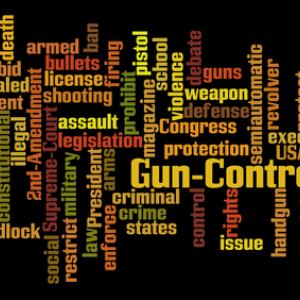
Gun control word cloud, Rob Wilson / Shutterstock.com
Red, white, and blue. Pick-up trucks. Apple pie. Baseball. Church on Sunday. And guns. You can't get much more American than that, or so it seems here in Montana. This week a regional newspaper posted on Facebook looking to find proponents of greater gun restrictions for an article they were writing. Within minutes the request was laughed at, belittled, and deemed unlikely. Truth is, even if someone did lean toward greater gun control, they never would have publicly responded. To utter such absurdities is equivalent to branding yourself anti-freedom, anti-American, and even anti-Christian. To listen to the rhetoric, gun control of any kind is nothing more than an eager embrace of Nazi-fascism, Chinese-communism, and the demise of all things American. And surely God would disapprove.
Which makes me wonder: what would God say about gun control? Not in some sort of glib WWJD-type platitude, nor in an entangled concoction of American freedom and Christian theology. And definitely not in a sensationalized proof-texting approach to scripture. But honestly, can our faith inform this conversation? And should it?
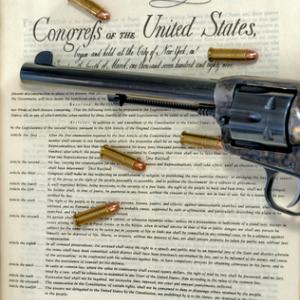
Bill of Rights, Charles Knowles / Shutterstock.com
How did this gun-owner-since-he-was-eight find himself at a prayer vigil to end gun violence on the steps of the Michigan state capitol? The easy answer is that Michigan Prophetic Voices, a nonpartisan, statewide organizing clergy group invited me to be there. But I had another reason.
In my family owning a gun was explained as a rite of passage, not as a Second Amendment right. When my father handed me my first gun he said, "You are old enough now to learn how to use this safely. There is one thing you have to promise me: never point it at anyone. If you do, I will take it away for good." I made the promise.
The man who said those words had heard different words from his father. "Never steal another man's property," my grandfather had told my dad, "and if it's yours, you fight like hell to keep it."
Those words shaped events of an early August morning in the 1970s when both of those men leveled shotguns at would-be burglars in the family business and, out of fear for their own lives, fired. One of those 20-something men was killed.
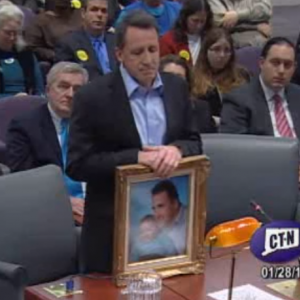
Neil Helin testifying in a Connecticut gun violence hearing.
We know we are addicted to something when that behavior damages our relationships with people. When alcohol, drugs, food, gambling, or work is more important than mother, father, husband, wife, child, friend, or neighbor, we know we have a problem. Similarly, we know that we are worshipping an idol when a created thing becomes more important than the Creator, when we put our faith in our fears and a dead thing that cannot love us back becomes the object of our ultimate concern. We know we are worshipping an idol when our devotion fails to cause us to love and to respect our neighbor.
In a Connecticut hearing about gun violence, Neil Heslin — a father whose son died in the mass shooting at the Sandy Hook Elementary School —asked why any one individual citizen needs military-style assault weapons and high-capacity magazines. People in the room answered by quoting the Second Amendment. In this case, the Second Amendment was more important than this father’s pain. Their lack of respect for his pain indicated a deficit of both compassion and love, not only for this grieving father but for a grieving nation.
Let us be clear. The Second Amendment is not holy writ, and a gun is not God. Far too many Americans have made these created things, these inanimate objects more important than the compassion we ought to have for one another. This is fetishism. This is idolatry. This is morally wrong.
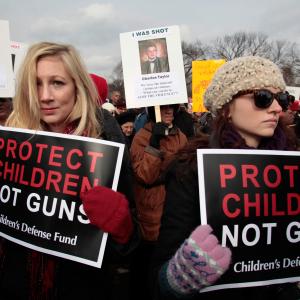
Thousands of people participate in the March on Washington for Gun Control on January 26. YURI GRIPAS/AFP/Getty Images
Pastors, parents, and people of faith — they can make the most difference in this country. We have seen it just this week on immigration reform. On Monday, in a breathtaking display of bipartisanship not seen for years in our dysfunctional capitol city, Democratic and Republican senators unveiled their plan for fixing the horribly broken immigration system — which their partisan irresponsibility caused. It was quite amazing, really. The very next day, President Barack Obama announced his commitment to and principles for comprehensive immigration reform amid a cheering crowd of young people in a Las Vegas high school gymnasium.
Political courage has suddenly replaced partisan roadblocks and official reticence to take on the controversial issue of immigration. What changed all this was, in my view: the courage of the young undocumented “DREAMers” who risked stepping out and speaking up; a change of heart among many law enforcement officials who find the present system untenable; business leaders who realize the economy now depends on immigrant labor; and, most dramatically, the faith community’s conversion to what Jesus said about welcoming the stranger as we would welcome him, and treating immigrants among us — who are the largest growing group in our faith communities — as our brothers and sisters in Christ. It’s been basic: Gospel and relationships — but it has changed immigration politics. And as others, including those in the White House and the Congress, will tell you: evangelicals’ entry into this debate has been the primary political game changer.
We have a real battle before us now, and the ugly xenophobia and anti-Hispanic rhetoric that has resisted reform before will no doubt re-surface again. But that angry — and I will say racist — talk is what sunk the Republican Party in this last election. And the election has changed everything—even many Republicans’ sentiments. In this moral battle over the last several years, I have witnessed the roles of pastors, parents, and people of faith. Their roles have made all the difference.
Could that now happen again on guns? It will certainly be a long, up-hill battle (as immigration once was), but I think a change is possible here too.
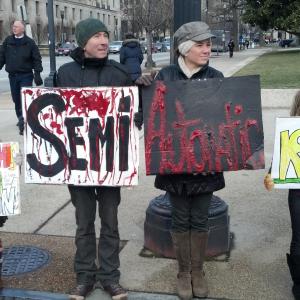
Protestors march for common sense gun legislation in Washington, D.C. Photo by Krystal Brewer / Sojourners
So you might think that religious folks for the most part are not big fans of guns, and for the most part you’d be right.
And then you run across these comments from a California legislator, who said guns are “essential to living the way God intended.” That was Rep. Tim Donnelly, who told a Christian radio show Jan. 16 that guns “are used to defend human life. They are used to defend our property and our families and our faith and our freedom.”
Well, yes, guns are used that way. They are used in lots of other ways too — to kill people we don’t like, to hold up banks, to commit suicide. It’s harder to wrap those under the banner of God’s intent.
For Christians, it’s hard to square the deification of guns with Jesus telling his followers to put away their swords, even as he was being arrested and led off to death.
That’s why a wide coalition of religious voices are speaking out in the great national debate about how we can live up to the Second Amendment’s call for having a “well-regulated militia.” Notice the words “well-regulated.”
As the Very Rev. Gary Hall, the new dean of the National Cathedral in Washington, D.C., said two days after the horrific shootings at Newtown: “I believe the gun lobby is no match for the cross lobby.”
The Senate Judiciary Committee held its first hearing on gun control in the new Congress this morning. The first witness was former Rep. Gabrielle Giffords, D-Ariz., who survived being shot in the head two years ago.
Here, via CBS News, is her statement.
"Thank you for inviting me here today. This is an important conversation for our children, for our communities, for Democrats, and Republicans.
"Speaking is difficult but I need to say something important.
"Violence is a big problem. Too many children are dying — too many children. We must do something.
"It will be hard. But the time is now. You must act. Be bold. Be Courageous. Americans are counting on you. Thank you."
Other witnesses included Gifford’s husband Mark Kelly, James Johnson, chief of police for Baltimore County, Md., and chairman of the National Law Enforcement Partnership to Prevent Gun Violence, and Wayne LaPierre, CEO and Executive Vice President of the NRA.

President Obama signs executive orders on new gun law proposals with children. Chip Somodevilla/Getty Images
When I was a little girl, my mother and I prayed together every night:
Now I lay me down to sleep.
I pray the Lord my soul to keep.
If I should die before I wake,
I pray the Lord my soul to take.
And then I would ask God to bless a list of people who were on my mind.
Every night I spoke about my own death, but death was not real. It never occurred to me that I would die or that my parents would die.
One day when I was in the fifth grade, we heard gun shots outside our school. Our teachers did not let us go outside for recess that day because a woman had been killed, caught in the crossfire of a domestic dispute between her son and his wife. By the time school was out, the body had been removed; there was no yellow crime scene tape. There was still blood on the ground to mark the spot of this tragic death. The next day it would be washed away.
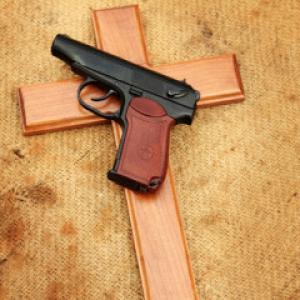
Some churches are offering concealed carry certification classes to reach out to non-Christians. RNS photo courtesy iStockPhoto.
The Arkansas Senate has passed a bill that lifts a ban on carrying concealed weapons in church.
The proposal, which goes to the Arkansas House for consideration, would allow churches to decide which, if any, worshippers with concealed carry permits can bring their firearms inside.
The measure passed 28-4 on Monday Jan. 28, KATV reported.

Photo by Krystal Brewer / Sojourners
Over the weekend I joined more than 6,000 people in a march for common sense gun control legislation.
The ground was covered in snow and ice, air so cold we could see our breath, on Saturday morning as we marched silently from the Capitol Building to the Washington Monument. In front of me, 100 residents from Newtown Conn., carried signs that read, “We Are Sandy Hook.” By my side stood an elderly woman with a sign reading, “Guns kill people. People kill people. Let’s work on both TOGETHER.”
Behind me, beside me, and scattered throughout the crowd of silent marchers more than 1,000 simple white signs were also displayed — carrying the names of victims of gun violence who have been permanently silenced.
They were names like Charlotte Colton, a mother of three who was gunned down along with seven other people at a U.S. Postal Service facility in Goleta, Calif.
Names like Laura Webb, who was shot and killed in a salon while styling her mother’s hair in a massacre that killed eight people.
Names like Vanessa Quinn, 29, one of four victims gunned down in a mall in Utah while she was picking out her wedding ring.
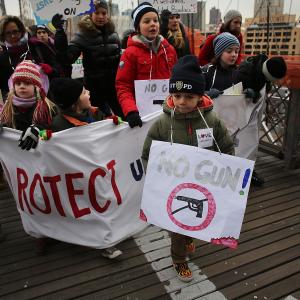
Participants with One Million Moms for Gun Control march across the Brooklyn Bridge on January 21. Spencer Platt/Getty Images
Much has been said, since the massacre at Newtown, Conn., about our American culture of violence. It is no exaggeration. In 2012, the United States had three mass shootings within six months. According to a study published in the Washington Post, our nation’s gun murder rate is roughly 20 times the average of all other developed countries.
We should not be surprised. Not only have we created a culture of violence, we glorify violence in our movies, television shows, and video games. Even in pro sports, players increasingly settle disagreements on the court or field with physical altercations, reinforced by the cheers of raved fans.
The huge surge in gun sales, after President Barack Obama announced his intent to have Vice President Joe Biden make recommendations to curb gun violence, attests to the misguided fears of many Americans.
We have a paranoid citizenry who, like Sen. Rand Paul (R – Ky.), mistakenly falls into the delusion that arming more people with guns is the answer.
So here America is, coping with this assault on our sensibility, at a time during the year when we celebrate the teaching of the great civil rights leader the Rev. Dr. Martin Luther King, Jr. It was King who successfully applied the force of nonviolent resistance to end segregation in America, and it is his voice we must listen to in this time of increasing violence in our culture.
“Idolatry of guns.” What does that mean, exactly?
It might be hard to admit, but if you think about it, you can see that many groups in the United States see guns as sacred. Guns are not only the solution to our problems, they will save us from evil. Wayne LaPierre, the executive vice president of the National Rifle Association, stated this himself: “The only thing that stops a bad guy with a gun is a good guy with a gun.”
Do we really believe this? If we stop and think about it, we don’t. Our protection does not come from guns, and we do not live in a binary society of good and evil, where the right to hold dangerous weapons can be allocated to people who are entirely virtuous.
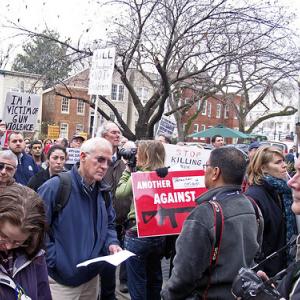
Protestors gather outside the NRA's Washington, D.C. office on Dec. 17, 2012. Photo by majunznk / Flickr
When I was in high school, my family moved from a Black Chicago Southside neighborhood fraught with gang tensions to a nice, multiracial middle-class community further south. Yet, my mom and dad still drove my brothers everywhere, so they would not get shot walking to the basketball court or to a friend’s home because of their shoes, their coat, or the color of their shirt. It was the ’70s and Marvin Gaye’s anthem asked the question on the minds of a generation: What’s going on?
Decades later, it is still my question. Six Sikhs killed in worship in Wisconsin. Thirty-three shot dead at Virginia Tech. Twelve killed and 58 injured in a movie theater in Aurora. One teacher and 12 students at Columbine. Six women, eight little boys, and 12 little girls in classrooms in Newtown. Those babies still had their baby teeth. What’s going on?
Marian Wright Edelman, president of the Children’s Defense Fund, cites these stats in her recent Huffington Post blog: 119,079 children and teens have been killed by gun violence in our nation since 1979. It is as though 4,763 classrooms of young people have been killed by guns. Twenty-two times more children and teens have been killed since 1979 than military personnel in the Iraq and Afghanistan wars combined. That cracks my heart wide open.
The shootings at Sandy Hook took our breath away. We felt in our hearts, this could happen to my child, to my neighbor’s child, and in my community. Unfortunately, in many communities, like my neighborhood in Chicago, we’ve known for a very long time that our children were in the line of fire.
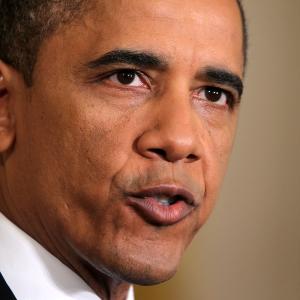
U.S. President Barack Obama speaks during his final news conference of his first term. Alex Wong/Getty Images
President Barack Obama and Vice President Joe Biden announced today a comprehensive plan to address gun violence in the wake of mass shootings in Newtown, Conn., and Aurora, Colo. The plan includes calling on Congress to require universal background checks, restore a ban on military-style assault weapons and 10-round limit to magazines, and implement stronger punishment for gun trafficking. The plan also includes measures aimed at increasing school safety and access to mental health services.
"This is our first task as a society: keeping our children safe. This is how we will be judged," Obama said, accompanied children who wrote to the White House calling for an end to gun violence.
In the 33 days since the Sandy Hook shooting, "more than 900 of our fellow Americans have reportedly died at the end of a gun," Obama said. "… every day we wait, that number will keep growing."
Biden, who has met with more than 200 groups representing various interests including law enforcement and people of faith, said the nation has a "moral obligation" to do everything in its power to address gun violence.
The announcement comes a day after faith leaders, including Sojourners president and CEO Jim Wallis, publicly called for many of the same measures, including reinstating the assault weapons ban, closing background check loopholes, and making gun trafficking a federal crime.
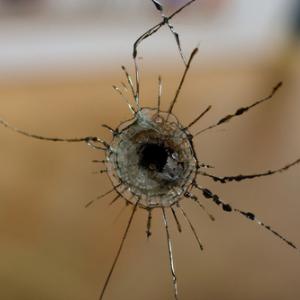
Photo: Kaygorodov Yuriy / Shutterstock.com
Violence does not equal power.
Martin Luther King, Jr., understood this. Yesterday was King’s 84th birthday. This year the national holiday to honor him will coincide with President Barack Obama’s second inaugural ceremony. And, all of this happens in the wake of one of the worst mass shootings in the nation’s history. One month after the shootings at Sandy Hook Elementary School in Newtown, Conn. — which left 20 children and six adults dead, plus the killer’s mother, found dead in her home — the country grapples with the issue of gun violence. If the country is to come to consensus on the issue, we will have to distinguish between violence and power.
Vice President Joe Biden gave recommendations to the president regarding gun safety on King’s birthday. The questions the media are asking already abound: What recommendations can the president implement through executive order? Can an assault weapons ban pass Congress? Will victims and gun safety advocates be able to persuade Congress to pass meaningful legislation?
There will be varying interpretations of the Second Amendment, and there will be some who will argue that guns are necessary for self-defense. We will have the discussion as to whether or not the gun culture in the United States has taken on religious proportions.
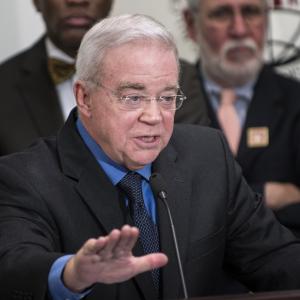
Jim Wallis speaks during a press conference at the United Methodist Building. BRENDAN SMIALOWSKI/AFP/Getty Images
WASHINGTON — Dozens of the nation’s faith leaders said on Tuesday that they’re ready to take on the gun lobby and demanded that politicians take quick and concrete steps to stem gun violence.
At a Capitol Hill press conference and in a letter to Congress, more than 45 clergy and heads of religious groups — representing the spectrum of American religious life — petitioned lawmakers to reinstitute a ban on assault weapons, require background checks on all gun buyers, and make gun trafficking a federal crime.
Organized by the two-year-old coalition Faiths United To Prevent Gun Violence, the signers said the slayings at a Newtown, Conn., elementary school last month had pushed them to redouble their efforts, and created an opportunity to beat back the gun lobby.
The Rev. Jim Wallis, the evangelical who heads the progressive Christian group Sojourners, took on Wayne LaPierre, the outspoken executive vice president of the National Rifle Association, directly.
LaPierre’s statement after Newtown that the “the only thing that stops a bad guy with a gun is a good guy with a gun” is “morally mistaken” and “religiously repugnant,” Wallis said.
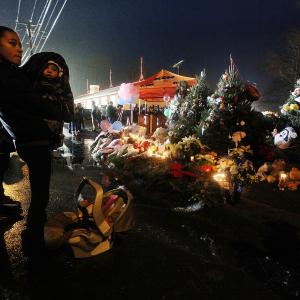
Isabel Lebron holds son Izaiah Taylor at a memorial with donated Christmas trees honoring victims. Mario Tama/Getty Images
The New Year is upon us and it is time for us to participate in the yearly tradition of setting new goals and listing our resolutions. Even if you deny it, I suspect that when that calendar year rolls over there is some part of your brain where you ask yourself a few questions … about things that you want to change, do differently, tasks you want to tackle this year.
We poke fun at the tradition mostly because we all do it and most of us will break resolutions within a month, but I still argue that the process itself is valuable. We had BETTER be investing time into goal setting for “where there is no vision the people perish” (Proverbs 29:18, KJB). Another translation says: “Where there is no vision the people are unrestrained” (NASB). Still another says: “Without revelation the people run wild” (HCSB).
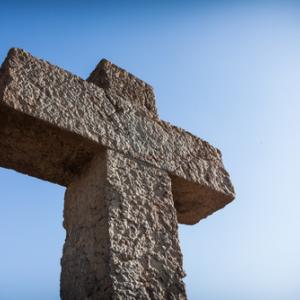
Photo: Cross, © Roman Tsubin / Shutterstock.com
Facebook is breaking my heart.
As I survey the reactions of my fellow evangelicals to the Newtown tragedy, I have seen three strains of thought, each of which absolve us of any responsibility: (1) It would have been different if the principal or a teacher was armed; (2) If Americans care about the slaughter of innocent children, why don't they care more about abortion?; and (3) The secularization of school and society plays a role in these shootings. A few stray comments about mental illness have also floated around vaguely.
Absent from all of this analysis is any consideration of our own failure to do exactly what evangelicals should be all about: Evangelism, in the form of reaching out and giving meaning to lost souls like the loner kid who became the 20-year-old who committed these murders. If a relationship with God is what gives a young life a connection to community, a sense of humility and service, and a devotion to what is good, that is exactly what Adam Lanza needed.
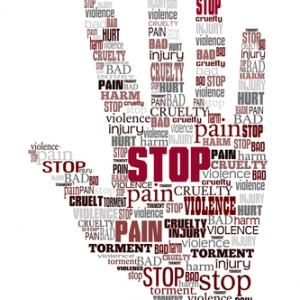
Photo: Violence image, © Kasza / Shutterstock.com
This is not a blog post about gun control. Everything that can possibly be said about that subject, pro or con, has already been said millions of times since Friday. We are talking too much, too soon. In the words of my rabbi, “Judaism teaches that when there is nothing to say we should say nothing….Sometimes only silence gives voice to what has happened."
We Americans should all be sitting shiva.
But when, next week, we rise from our knees and begin working – together, I hope – to reduce the terrible problem of violence in our country, we must realize that our disorder goes much deeper than simply owning too many guns, and that any effective solution will have to go much deeper too.
When they are distressed, some people clean house or do push-ups I collect data. All week I have been amassing numbers and arranging them in rows and columns, trying to shed light on the question: Why are some nations violent while others are not?
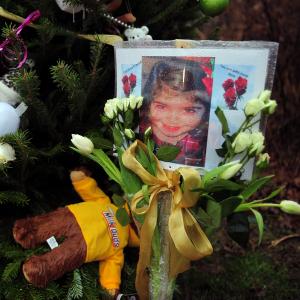
A photo of Caroline Previdi, one of the Newtown shooting victims. EMMANUEL DUNAND/AFP/Getty Images
*If you have not read the Book of Job, this pastor recommends it as a must-read during this time of national crisis. There is much to digest; it requires no theological confession (only a sincere concern for humanity); and it reminds us of how little we know, how much we speak.*
The Book of Job provides a helpful but not fully welcome commentary on how we might read and understand the tragic shooting at Sandy Hook Elementary School. Because that’s what we want right? Understanding? Things happen and we want to know WHY, so as to file them in our Rolodex of infinite human wisdom. Except … Job could do nothing to prevent the tragedies that befell him, and as he sat in the silence of his grief – having just lost his 10 children, his possessions, and his health – all he had was his three friends who came to sit with him. Except … sitting was not enough for them. They had to talk. They had to explain WHY this happened to Job. And in the process they forgot about Job.
Tragedies are always the occasion for extraordinary public debate: New Orleans moved from the victims to the state of FEMA in 2005; Columbine rushed us from victims to gun control; and Darfur moved from victims to foreign policy, as does Israeli-Palestinian conversation today push us away from the exiles themselves. Newtown, Conn., is no different, where a major cable news outlet was waiting in the parking lot to talk to children (not care for children, but talk to them about what was going on inside, focusing on their eyes and ears, but not their hearts). As if a 6 year old can wax eloquent on the horror they’ve witnessed. Sensationally irresponsible: some of the worst journalistic ethics I’ve seen in … well … let’s not go there.
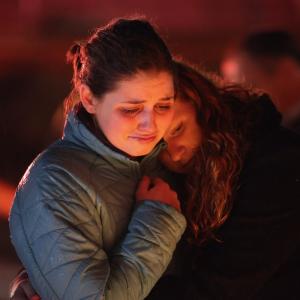
Rachel Berger (L), and Greta Waag embrace while visiting a makeshift memorial in Newtown. John Moore/Getty Images
O Flower of Jesse’s stem,
you have been raised up as a sign for all peoples;
kings stand silent in your presence;
the nations bow down in worship before you.
Come, let nothing keep you from coming to our aid.
In 2012 more than one hundred young people were killed by gun violence in Chicago. More than a hundred. If you start adding up the numbers, there was a time there in the summer where Chicago was more dangerous than Afghanistan. Well, parts of it were. It's a big place, you know.
As tragic as the shooting was in Connecticut —and I am truly not interested in minimizing the grief or outrage — we have to wake up and realize that more children are killed every year in the U.S. and we seldom cry in outrage. Not as a nation. There were marches in protest by Chicago churches.
The news media covered the march but not the murders.

Protesters marching with the social activist group CREDO for stronger gun laws. PAUL J. RICHARDS/AFP/Getty Images
President Obama addressed the nation on Wednesday morning to establish a commission led by Vice President Biden on stronger gun safety laws. Gone was the passion of his address at the interfaith service in Newtown and in place we have back the above-the-fray politician.
However, one point was clear. “If we are going to change things,” he said, “it is going to take a wave of Americans … standing up and saying ‘enough’ on behalf of our kids.”
Will Obama’s address beat the National Rife Association’s messaging strategy?
On Friday, Dec. 21, the NRA will hold its first a press conference after the Newtown, Conn., massacre—and America’s first reasonable conversation on stronger gun laws will come to an end.
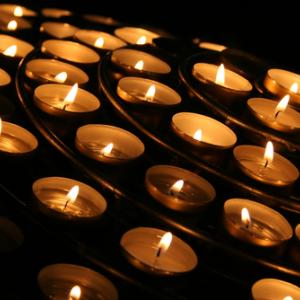
Photo: Candle vigil, © Canoneer/ Shutterstock.com
Luke 1:39-55
Sometimes, the worse the tragedy, the more abhorrent the theology it elicits.
Still numb from the overwhelming evil perpetrated against helpless children and schoolteachers last Friday, now we have to read harsh words from James Dobson and others who declare the senseless carnage a sign of God’s judgment against America. His words are disgraceful. I find them exploitative and unchristian.
Certain Christians seem compelled to speak for God in disorienting moments like these, and the results are frequently terrible. The rest of the church has a responsibility to get angry and repudiate the statements.
In times like these, I find myself wanting to disavow anyone’s attempts to speak on God’s behalf.
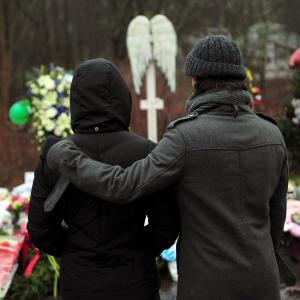
People pay their respects at a makeshift shrine to Sandy Hook victims. EMMANUEL DUNAND/AFP/Getty Images
In the wake of the recent school shooting tragedy in Connecticut, we will undoubtedly hear the lament, 'America is at the crossroads', as we struggle to contain an increasingly violent society. Sadly, this country left the crossroads some time ago. We have passed the tipping point, and are rapidly descending into the abyss of chaos when it comes to respect for human life.
Well-meaning voices are sounding the alarm that things are different now — innocent children have died in great numbers in Connecticut. This is true, but people are dying every day in towns and cities throughout our nation due to acts of senseless violence. The deaths in Connecticut represent an unspeakable new low, but we have been steadily arriving here for decades.
We will rightly pray for and comfort the families and communities of the victims. We should do no less. There will also be calls for greater gun control. However, we can count on this: we cannot count on our governments to get this epidemic of violence under control. Nor can we retreat to the false comfort of innocuous statements such as, 'Guns don't kill people. People kill people.'

Some of the grieving are left wondering why God let this happen. RNS Photo
“Oh, God!”
That cry has echoed ever since news of the horrific shooting at Sandy Hook Elementary School in Newtown, Conn.
As the names of those who died are made known, that cry is followed by a question: Why? Why does God allow evil?
This agonizing question arises among religious believers after tragedies great and small. It’s also one that priests, pastors, rabbis, and imams will wrestle with.
The Rev. Jerry Smith of St. Bartholomew Episcopal Church in Nashville said that although this weekend marked the third Sunday in Advent, which focuses on hope in advance of Christmas, the church also has to talk about the reality of evil.
“We have to speak about this shooting and we have to recognize, this is the very darkness that Christ came into the world to dispel,” Smith told The Tennessean.
The Rev. Neill S. Morgan, pastor of Covenant Presbyterian Church in Sherman, Texas, says on the congregation’s website that now is a time for prayer.
But, says Morgan, “all the existential questions about God, justice, and love” will come. “We wonder what we can do to prevent such violence in the world, our nation, and our community.”
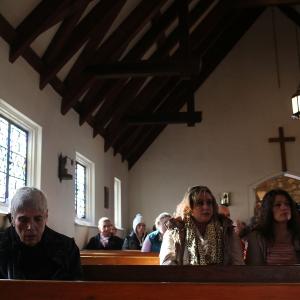
People attend a prayer service to reflect on the violence at the Sandy Hook School. Spencer Platt/Getty Images
NEWTOWN, Conn. — Dealing with the pain of the school shooting that claimed 28 lives will take faith, support, and joyous Christmas celebrations, church leaders said at the first Sunday services held since the tragedy.
At houses of worship around town, people gathered in pews, crying, kneeling, and hugging each other through services that focused on remembering the victims of the Sandy Hook Elementary School shooting, uniting the community, celebrating the meaning of Christmas and preventing similar disasters.
Yet even this beleaguered town's day of worship provided a moment of fear when congregants at St. Rose of Lima Roman Catholic Church fled the building, saying they were told there was a bomb threat. Police with guns drawn surrounded the church. No injuries were reported, but the church canceled all events for the day.
Earlier in the day, services at St. Rose, much like other places of worship in the area, were focused on the tragedy.
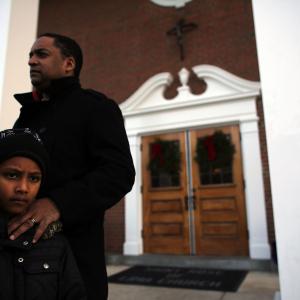
David Echevarria (7) and his father Daniel from Newtown stand outside of a church. Spencer Platt/Getty Images
One commentator suggested that it was precisely because God was not there that this heinous act happened. Gov. Mike Huckabee claimed we should not be surprised to see this kind of violence since we have removed God from our schools and our society. His sentiment is to say, “God is NOT here.” If that is the case, then it surely can explain the existence of pure evil that we saw displayed on Friday.
However, thinking like that of Gov. Huckabee suggests that we somehow have the power to remove God from our schools and our society. This kind of God is quite small, weak, and impotent — one that is dictated by the mere whims of humanity. This is not the God of whom Matthew spoke.
Matthew spoke of the Almighty God fully embodied and revealed in the person of Jesus. So much so that he claimed he was Immanuel: God with us. He is here not in spite of the pain, nor did he come to explain it away. God is here in the midst of our suffering.
The hope of Advent is that God responded to the suffering of humanity by entering into it with us. He did not stand outside of it and look in with a wincing face and hope that everything would somehow work out. Nor did he see humans who removed him from their schools and societies and say, “Well fine, then, have it your way!” Not at all.
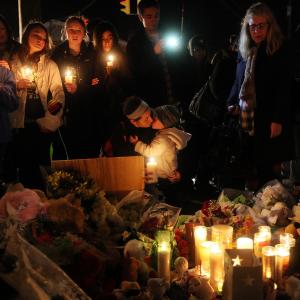
Rachel Pullen (C) kisses her son Landon DeCecco at a memorial for victims near the school. Mario Tama/Getty Images
Our deepest question now is whether what happed on Friday — and what has focused the attention of the entire nation — will touch the nation’s soul or just make headlines for a few days.
I think that will be up to us as parents — to respond as parents. The brutal shooting of 20 six- and seven-year-old school children in their own classrooms touches all of us, and as the father of two young boys I’m especially struck how it touches parents. From the heartbreak of the parents in Newtown to the tears in the eyes of Barack Obama as he responded — not just as the President, but also as the father of two daughters — to the faces of the first responders and reporters who are parents. I have felt the pain and seen the look on the face of every parent I have talked with since this horrendous event occurred. Virtually every mother and father in America this weekend has turned their grieving gaze on their own children, realizing how easily this could have happened to them. The emotions we’ve seen from the Newtown parents whose children survived, and the feelings of utter grief for those parents whose children didn’t, have reached directly to me.
Saturday, the day after the Connecticut massacre, Joy and I went to our son Jack’s basketball game. The kids on the court were all the same ages as the children who were killed on Friday. I kept looking at them one by one, feeling how fragile their lives are.
Our first response to what happened in Newtown must be toward our own children. To be so thankful for the gift and grace they are to us. To be ever more conscious of them and what they need from us. To just enjoy them and be reminded to slowly and attentively take the time and the space to just be with them. To honor the grief of those mothers and fathers in Connecticut who have so painfully just lost their children, we must love and attend to ours in an even deeper way.
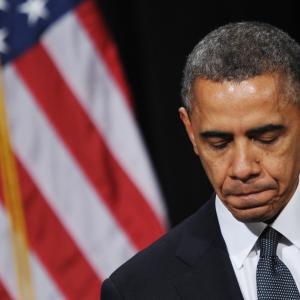
President Obama during a memorial service for the victims at Sandy Hook. MANDEL NGAN/AFP/Getty Images
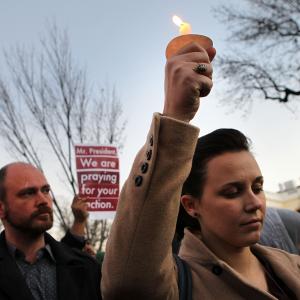
Julie Henson of San Francisco joins other people outside the White House to remember shooting victims. Alex Wong/Getty Images
The little children were probably dreaming of Christmas morning when a monster opened fire with his state-of-the-art weapons. Don’t say you’re shocked that 20 children were slaughtered — and more of us must admit that, unless something changes, we expect there will be more such massacres. Isn't it time for this nation to say, "We've had enough?"
When will people of faith awake and lead this gun-crazed country to adopt laws which make our streets and elementary schools as safe as those in other developed nations? Any gun lover who does not grieve over this tragedy at Sandy Hook Elementary School, and who continues to oppose any and all preventive measures to stop gun violence, serves an idol instead of the Living God.